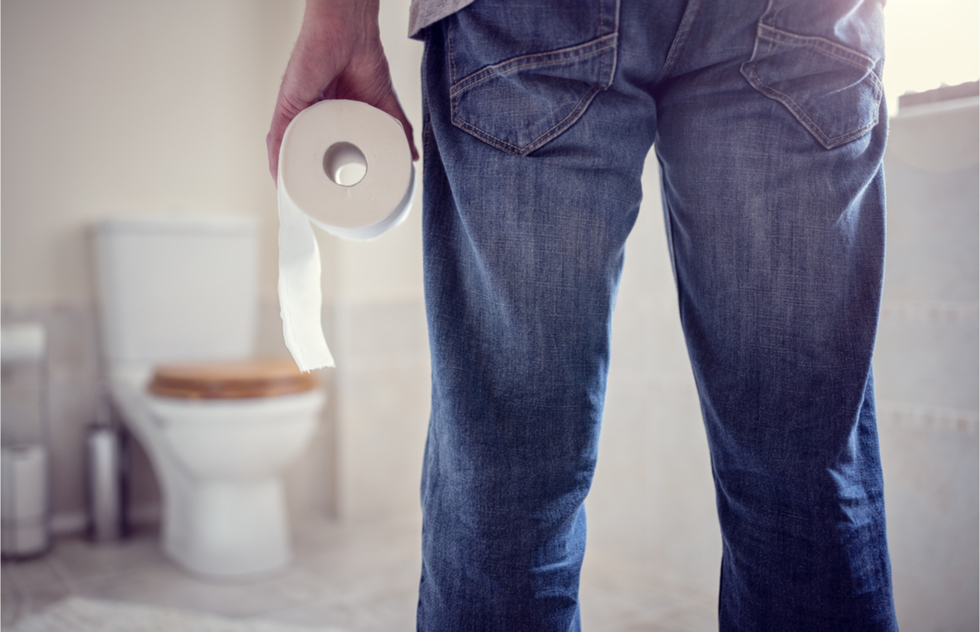It’s often the proverbial elephant in the (wash)room: You’re traveling, but you can’t go.
Unfamiliar foods and irregular eating schedules can put one’s digestive tract into shock and this can lead to bowel discomfort. When our systems are disrupted, the resulting constipation woes can make traveling miserable.
We talked to a few respected gut health experts to find out what to do to get things moving again.
Why does travel cause constipation?
Gastroenterologist Dr. Will Bulsiewicz (who goes by the nickname Dr. B) says that there are a few colliding reasons we tend to get constipated when we travel.
Unbalanced food: “I believe changes in diet are the principal driving factor,” says Dr. B. “It's only natural that when you're on vacation that you want to treat yourself,” which he explains usually translates into choosing convenient, and/or fast foods.
Dr. Robin Forman Rose, a board-certified gastroenterologist with Stamford Health Medical Group, says that indulgent foods may travel well but are often low in nutritional value, protein, phytonutrients, and fiber. “Instead, they’re high in simple carbohydrates and refined sugars,” explains Dr. Rose. An increase of such high-fat foods without taking in fruits and vegetables is a sure way to invite constipation.
A lack of water: “Being on vacation generally means a new environment—and we're either more active, out in the sun, or both,” explains Dr. B.
As a result, says Dr. Forman Rose, says many travelers can be unknowingly dehydrated, and when that happens, stool becomes hard and difficult to pass.
Being sedentary: Think of those long days lounging on the beach, aboard that cruise, or at that all-inclusive resort. Unfortunately, a lack of movement makes your whole system slow down and is a contributing factor to constipation.
Disrupted routine: Dr. Forman Rose explains that by definition, vacations change your normal daily routine. “Your meals will always be more irregular, both in timing and what you are eating. You’re most likely traveling to a different time zone as well, and this contributes to irregularity.”
“Every organism on the planet has a daily circadian rhythm, whether it be humans, animals, plants, or even the trillions of microbes in your gut,” says Dr B. “Unfortunately, rapid changes in circadian rhythm can confuse and stress your gut microbes, resulting in damage; and when this happens, we call this, in medical speak, dysbiosis.”
Dr. B calls this “gut lag.”
Fine, I get it. Gut health is super important. But if it happens on vacation, what can I do?
Dr. B says that “it's important to first mobilize the backed-up stool, then restore that rhythm that we are aspiring to.”
He says that we can reset our systems with a generous dose of milk of magnesia or magnesium citrate.
Once the colon is kickstarted with some relieving bowel movements, Dr. B says that it's “time to get back into our rhythm.” How? He recommends the combination of a prebiotic fiber supplement (such as wheat dextrin or acacia or beta glucan) and a stool softener. Plus, of course, adequate water intake for continued hydration.
What simple things can I do to avoid traveler’s constipation?
Take probiotics: “When my patients are traveling, I like to start them on it a few weeks prior to travel and have them take it even after they have returned from their trip,” says Dr. Forman Rose.
Get some fiber: Opt for fiber-rich snacks, says Dr. B. “Whether it's an apple, a handful of almonds, or some figs, they're all satiating, energizing, fiber-rich and can be had on the go.”
Dr. Forman Rose advises you to finish your vegetables. “Eat phytonutrients, fruits, and vegetables in a spectrum of hues which include green leafy vegetables, cruciferous vegetables [like broccoli and kale], berries, and other fruits high in soluble fiber.”
“A fiber supplement taken once or twice daily can also help to support our gut while on the road,” advises Dr. B.
Get Moving: Physical activity will help get things going. “Simply the act of moving around, a bit of light exercise, or even a stroll after meals will help,” offers Dr. Forman Rose. Lying by the water for 10 hours a day won’t help.
Hydrate: “It's extra important to ramp up our water consumption if we're more active than usual or in a hot and/or humid climate,” says Dr. B. “As a rule of thumb, you should drink half your total body weight in ounces,” he says.
That means a woman who weighs 120 pounds should drink 60 ounces of water daily. “When traveling, I would recommend exceeding this goal,” says Dr. Forman Rose.
Make sure your drinking water is safe, though; in some places, that may require buying bottled water.
Dry climates such as deserts, where water evaporates quickly, can also make you lose track of how much moisture you’re losing through sweat.
Dr. B suggests downloading an app, that will help you track water consumption (yes, they exist, and they have names like Hydro Coach and WaterMinder).
Eat with moderation: “Understandably, it's the instinct and desire to opt for fatty, rich food you may have never seen or had the opportunity to try before, but keep in mind that you want to actually enjoy your vacation,” says Dr. B. “Eating too heavy, and too frequently, will take the wind out of your sails and have you laying in bed in sweatpants making weird groaning noises.”
And that really would be a party pooper.






